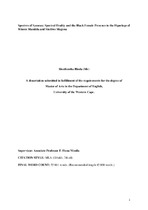| dc.description.abstract | The demands of modernity and globalisation present print culture as dominant in such a way that oral tradition is forced in to a shadowy position, because the latter tradition cannot be exploited entirely for profit. Dominant scholarship on oral studies therefore positions orality in the background of writing, so as to suggest that it is a past tradition of, and serves as a reservoir for, written literature. However, such approaches reveal theoretical gaps, highlighted, as will be shown in the thesis, by the effaced position of the black woman as storyteller. Orality, in this, becomes the spectre which haunts the writing of most African writers in the same way that the black woman haunts man -centred nationalism. Such spectrality is precisely one which is embodied if not by the black woman in nationalist discourse and in society in general. I begin in by examining the representation of an archetypal black woman namely Sycorax, in William Shakespeare’ s The Tempest. Even though Shakespeare is quite ambiguous about her racial identity, I interpret Sycorax– whose story is told by male characters– as a black black woman. | en_US |

